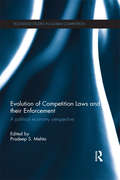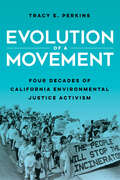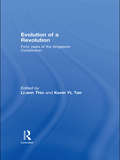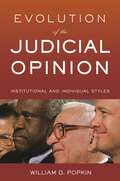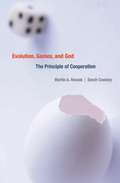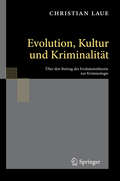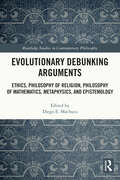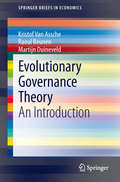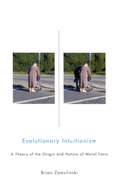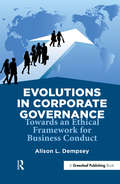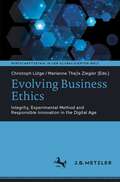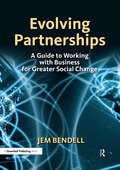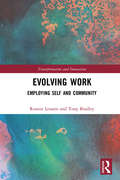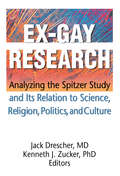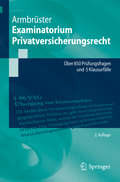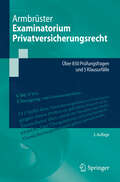- Table View
- List View
Evolution of Competition Laws and their Enforcement: A Political Economy Perspective (Routledge Studies In Global Competition Ser.)
by Pradeep S. MehtaThis edited volume identifies the various country specific factors that warrant changes in the design and implementation of competition laws. The book covers case studies of nine countries of differing sizes and at varying stages of economic development, that have at one stage or another repealed extant competition laws for new ones, and seeks to examine the motivations and contexts under which this was done. The countries examined include the Czech Republic, Hungary, India, Ireland, Poland, Serbia, South Africa, Tanzania and the UK. Tracing the evolution of competition regimes in the countries covered, the book provides lessons for countries still in the process of forming their competition regimes. The contributions show that the road to strong competition regimes is seldom smooth, and that social, economic and political factors in the country hugely impact on the pace and effectiveness of competition reforms. The volume also addresses the issue of when the development of competition policies and laws can be seen to be in conflict with national development strategies.
Evolution of International Environmental Regimes
by Simone SchieleDrawing specifically on the international climate regime, Simone Schiele examines international environmental regimes from a legal perspective and analyses a core feature of international regimes – their ability to evolve over time. In particular, she develops a theoretical framework based on general international law which allows for a thorough examination of the understanding of international law and the options for law-creation in international environmental regimes. The analysis therefore provides both a coherent understanding of the international climate regime and a starting point for further research in other regimes.
Evolution of a Movement: Four Decades of California Environmental Justice Activism
by Tracy E. PerkinsDespite living and working in California, one of the county's most environmentally progressive states, environmental justice activists have spent decades fighting for clean air to breathe, clean water to drink, and safe, healthy communities. Evolution of a Movement tells their story—from the often-raucous protests of the 1980s and 1990s to activists' growing presence inside the halls of the state capitol in the 2000s and 2010s. Tracy E. Perkins traces how shifting political contexts combined with activists' own efforts to institutionalize their work within nonprofits and state structures. By revealing these struggles and transformations, Perkins offers a new lens for understanding environmental justice activism in California. Drawing on case studies and 125 interviews with activists from Sacramento to the California-Mexico border, Perkins explores the successes and failures of the environmental justice movement in California. She shows why some activists have moved away from the disruptive "outsider" political tactics common in the movement's early days and embraced traditional political channels of policy advocacy, electoral politics, and working from within the state's political system to enact change. Although some see these changes as a sign of the growing sophistication of the environmental justice movement, others point to the potential of such changes to blunt grassroots power. At a time when environmental justice scholars and activists face pressing questions about the best route for effecting meaningful change, this book provides insight into the strengths and limitations of social movement institutionalization.
Evolution of a Revolution: Forty Years of the Singapore Constitution
by Li-Ann Thio Kevin Yl TanThis book presents a timely assessment of the impact of history, politics and economics in shaping the Singapore Constitution, going beyond the descriptive narrative, the authors will cast a critical eye over the developments of the last 40 years.
Evolution of the Judicial Opinion: Institutional and Individual Styles
by William D. PopkinIn this sweeping study of the judicial opinion, William D. Popkin examines how judges' opinions have been presented from the early American Republic to the present. Throughout history, he maintains, judges have presented their opinions within political contexts that involve projecting judicial authority to the external public, yet within a professional legal culture that requires opinions to develop judicial law through particular institutional and individual judicial styles.Tracing the history of judicial opinion from its roots in English common law, Popkin documents a general shift from unofficially reported oral opinions, to semi-official reports, to the U.S. Supreme Court's adoption in the early nineteenth century of generally unanimous opinions. While this institutional base was firmly established by the twentieth century, Popkin suggests that the modern U.S. judicial opinion has reverted—in some respects—to one in which each judge expresses an individual point of view. Ultimately, he concludes that a shift from an authoritative to a more personal and exploratory individual style of writing opinions is consistent with a more democratic judicial institution.
Evolution, Games, and God
by Sarah Coakley Martin A. NowakEvolution, Games, and God explores how cooperation and altruism, alongside mutation and natural selection, play a critical role in evolution, from microbes to human societies. Inheriting a tendency to cooperate and self-sacrifice on behalf of others may be as beneficial to a population’s survival as the self-preserving instincts of individuals.
Evolution, Kultur und Kriminalität
by Christian LaueDie Evolutionsbiologie gilt einerseits als Königsdisziplin der Biologie, andererseits wird sie nach den erschreckenden Erfahrungen mit der Kriminalbiologie vor allem mit Eugenik, Sozialdarwinismus und Rassismus in Verbindung gebracht. Tatsächlich bietet die Evolutionstheorie viele Antworten auf kriminologisch interessante Fragen. Der Autor überbrückt den Graben zwischen sozialwissenschaftlich orientierter Kriminologie und den Biowissenschaften und untersucht, inwieweit neue Erkenntnisse aus der Evolutionsbiologie die Kriminologie bereichern können.
Evolutionary Debunking Arguments: Ethics, Philosophy of Religion, Philosophy of Mathematics, Metaphysics, and Epistemology (Routledge Studies in Contemporary Philosophy)
by Diego E. MachucaRecent years have seen an explosion of interest in evolutionary debunking arguments directed against certain types of belief, particularly moral and religious beliefs. According to those arguments, the evolutionary origins of the cognitive mechanisms that produce the targeted beliefs render these beliefs epistemically unjustified. The reason is that natural selection cares for reproduction and survival rather than truth, and false beliefs can in principle be as evolutionarily advantageous as true beliefs. The present volume brings together fourteen essays that examine evolutionary debunking arguments not only in ethics and philosophy of religion, but also in philosophy of mathematics, metaphysics, and epistemology. The essays move forward research on those arguments by shedding fresh light on old problems and proposing new lines of inquiry. The book will appeal to scholars and graduate students interested in the possible skeptical implications of evolutionary theory in any of the above domains.
Evolutionary Debunking Arguments: Ethics, Philosophy of Religion, Philosophy of Mathematics, Metaphysics, and Epistemology (Routledge Studies in Contemporary Philosophy)
by Diego E. MachucaRecent years have seen an explosion of interest in evolutionary debunking arguments directed against certain types of belief, particularly moral and religious beliefs. According to those arguments, the evolutionary origins of the cognitive mechanisms that produce the targeted beliefs render these beliefs epistemically unjustified. The reason is that natural selection cares for reproduction and survival rather than truth, and false beliefs can in principle be as evolutionarily advantageous as true beliefs. The present volume brings together fourteen essays that examine evolutionary debunking arguments not only in ethics and philosophy of religion, but also in philosophy of mathematics, metaphysics, and epistemology. The essays move forward research on those arguments by shedding fresh light on old problems and proposing new lines of inquiry. The book will appeal to scholars and graduate students interested in the possible skeptical implications of evolutionary theory in any of the above domains.
Evolutionary Governance Theory: An Introduction
by Raoul Beunen Martijn Duineveld Kristof Van AsscheThis short books offers the reader a remarkable new perspective on the way markets, laws and societies evolve together. It can be of use to anyone interested in development, market and public sector reform, public administration, politics & law. Based on a wide variety of case studies on three continents and a variety of conceptual sources, the authors develop a theory that clarifies the nature and functioning of dependencies that mark governance evolutions. This in turn delineates in an entirely new manner the spaces open for policy experiment. As such, it offers a new mapping of the middle ground between libertarianism and social engineering. Theoretically, the approach draws on a wide array of sources: institutional & development economics, systems theories, post-structuralism, actor- network theories, planning theory and legal studies.
Evolutionary Intuitionism
by Brian ZamulinskiEvolutionary Intuitionism presents a new evolutionary theory of human morality. Zamulinski explains the evolution of foundational attitudes, whose relationships to acts constitute moral facts. With foundational attitudes and the resulting moral facts in place, he shows how they ground a plausible normative morality, give answers to meta-ethical questions, and provide an account of moral motivation. He explains the nature of moral intuitions and, thus, of our access to the moral facts. He shows that the theory makes confirmed empirical predictions, including the observable variation in moral views. The combination of intuitionism and evolutionary ethics enables Zamulinski to overcome the standard objections to both.
Evolutionary Intuitionism: A Theory of the Origin and Nature of Moral Facts
by Brian ZamulinskiEvolutionary Intuitionism presents a new evolutionary theory of human morality. Zamulinski explains the evolution of foundational attitudes, whose relationships to acts constitute moral facts. With foundational attitudes and the resulting moral facts in place, he shows how they ground a plausible normative morality, give answers to meta-ethical questions, and provide an account of moral motivation. He explains the nature of moral intuitions and, thus, of our access to the moral facts. He shows that the theory makes confirmed empirical predictions, including the observable variation in moral views. The combination of intuitionism and evolutionary ethics enables Zamulinski to overcome the standard objections to both.
Evolutions in Corporate Governance: Towards an Ethical Framework for Business Conduct
by Alison L. DempseyIn a world where the implications and consequences of corporate actions and decisions are potentially far-reaching and lasting, ethical standards − their observance and their breach − must be part of the language of business conduct, whether in the context of corporate transgressions, regulatory effectiveness, terms of engagement between business and their stakeholders, or the metrics used by investors in assessing performance and risk and understanding long-term value. This critically important book proposes a new paradigm for understanding, developing and maintaining standards of corporate governance. Its point of departure is not a position along the diverse paths of traditional corporate governance and regulatory theory, law and practice, nor specific questions of how to institute, implement and observe policies and practices that function as proxies for good governance. Instead, it starts with the idea of framing governance generally, and corporate governance specifically, as a matter of conduct that is guided by a set of fundamental ideals and principles. Evolutions in Corporate Governance attempts to answer the wider question of how to re-imagine a framework within which ‘good’ corporate governance − that takes account of and is responsible for the social, environmental, ethical as well as legal and economic dimensions of business conduct − is addressed alongside issues of profitability and competition, in the face of forces of globalization and business influence that are testing the limits of what can be accomplished by traditional law and regulation. Dempsey contends that meaningful change in behaviour will only come when there is a corporate governance framework that explicitly encompasses both law and ethics.
Evolutionäre Verhaltensökologie und Psychopathie
by Janko MeđedovićDieses Buch beleuchtet das Forschungsgebiet der Psychopathie anhand eines verhaltensökologischen Rahmens. Es besteht aus zwei Teilen. Der erste Teil vermittelt wissenschaftliche Erkenntnisse der menschlichen Verhaltensökologie, einschließlich:Grundlegende Konzepte der EvolutionsbiologieEvolutionäre VerhaltenswissenschaftenEvolutionsökologie der FamilieEvolutionäre KompromisseTheorie der LebensgeschichteVerhaltensökologie der PersönlichkeitPsychopathie und ihre aktuelle Entwicklung.Der zweite Teil des Buches beschreibt die empirische Forschung zur Psychopathie in einem evolutionsökologischen Kontext, der darauf abzielt, Kompromisse zwischen Fruchtbarkeit und Lebenserwartung bei Psychopathie, interagierende Phänotypen bei Psychopathie und elterliche Effekte im Zusammenhang mit Psychopathie zu untersuchen. Dieser Teil enthält die Diskussion der Ergebnisse der Studie, die auf mehreren theoretischen Konzepten basiert, die im ersten Teil beschrieben wurden.Dieser Band ist ideal für alle Wissenschaftler, die sich mit dem Thema Psychopathie beschäftigen und eine neue und zukunftsorientierte Brücke zwischen den Natur- und Sozialwissenschaften bauen wollen.Die Übersetzung wurde mit Hilfe von künstlicher Intelligenz durchgeführt. Eine anschließende menschliche Überarbeitung erfolgte vor allem in Bezug auf den Inhalt.
Evolving Business Ethics: Integrity, Experimental Method and Responsible Innovation in the Digital Age (Wirtschaftsethik in der globalisierten Welt)
by Christoph Lütge Marianne Thejls ZieglerBusiness ethics as a discipline has been evolving rapidly, and indeed needs to evolve constantly. This evolution is mandated more urgently than ever before as we plunge headlong, and with increasing velocity, into the era of automation, artificial intelligence and digitization. In a scenario where legal and policy guidelines are scarce or ambiguous, the role of business ethics in guiding academic and industrial research and innovation cannot be understated. Ethical codes and guidelines are needed for educators, scientists, industries, law and policy makers, as well as for the general public engaged with emerging technologies not only to ensure a smooth transition into the autonomous and digital age, but also to ensure that in the process, we do not unknowingly disengage from basic human rights, values and responsibilities. Traditional, time tested and universally accepted principles of (business) ethics, including principles of integrity, responsibility and sustainability must, therefore, not be abandoned, but rather permitted to evolve to address the unique issues that emerging technologies present to humankind. This evolution necessarily entails an evolution also in research methods (including methods that permit multi-disciplinary and multi-stakeholder engagement), entrepreneurship ethics and a multi-cultural understanding of human rights and responsibilities, as relevant to emerging technologies such as autonomous driving. The envisaged volume “Evolving Business Ethics: Integrity, Sustainability and Responsible Innovation in the Digital Age” accordingly brings together contributions in the field of business ethics from a diversity of perspectives and disciplines.
Evolving Partnerships: A Guide to Working with Business for Greater Social Change
by Jem BendellBy bringing together their respective competencies and resources for the greater good, governments, business, civil society and multilateral agencies have been seeking innovative ways to work together to respond to the myriad global challenges of our time: the impact of climate change; human security; the prevention, care and treatment of HIV/AIDS and other major diseases; the generation of new investment, entrepreneurship and employment; and financing for development. The appetite for such partnerships appears strong. Over 90% of corporate executives responding to a World Economic Forum survey felt that future partnerships between business, government and civil society would play either a major role or some role in addressing key development challenges. This trend will only be increased by the Western financial crisis and the retreat of the state from many areas of societal concern. In the last 15 years, many new partnerships have been formed, and many new people exposed to partnership ways of working. There have been remarkable successes, but also a range of concerns about effectiveness and accountability. Partnerships can work, but can they work better? Many practitioners are now asking how they can achieve a greater scale of impact to match the magnitude of the social and environmental challenges we face. When considering how to equip their organization or programme with the necessary skills to engage with companies in new ways, many leaders of NGOs or UN agencies hire staff from the private sector. Although such staff exchanges are important, it is not sufficient to rely on private-sector staff to develop and implement strategic forms of engagement. Rather, engaging business for social change is a specialism in itself. This book seeks to distil some of the author's 15 years of experience and key learnings on the advanced strategic planning of partnerships for people who work within civil society or public-sector organizations and who already partner with companies. Much of the research focus to date has been on operational issues, rather than on the strategic challenge of evolving partnerships to achieve a greater scale of impact. Rather than helping the reader with moving on from partnerships, this guidebook is intended to help with moving up to a greater scale of impact. The author identifies three generations in the evolution of cross-sector partnering and draws insights from the latest biological evolutionary theory on how complex systems can sustain themselves over time, translating this into a method for understanding and assessing partnering practice. Evolving Partnerships provides a rich and accessible mix of commentary, boxes for clarification, and 11 exercises to help the reader evolve partnering to achieve a wider level of impact – a level that responds to the scale, depth and urgency of the challenges we face today. Written by one of the world's leading authorities on partnerships and a key architect of global partnerships, including the Marine Stewardship Council, Evolving Partnerships will be essential reading for all those involved in cross-sectoral partnerships.
Evolving Work: Employing Self and Community (Transformation and Innovation)
by Ronnie Lessem Tony BradleyThe idea of Self and the authenticity of particular identities have been rapidly dissolving in the acids of post-modern globalising capitalism. The hegemony of patterns of work, wage-labor and the operation of labour markets in the American West (and European North) has ridden rough-shod over distinctive ways of enabling communities to flourish in many parts of the Southern and Eastern worlds (Global South). But, this is not inevitable. Indeed, as this book indicates, there are many practical examples across the globe – that connect with some of the most significant theoretical challenges to the operation of dehumanising work – which reveal that a profound reversal is taking place. As such, the core theme of this book is to show that a movement is occurring whereby self-employment can be transformed into communal work that employs the Self in ways that release the authentic vocations of people, individually and collectively. The approach taken in these chapters traverses the globe, utilising the original ‘integral worlds’ model that will be familiar to students of the Trans4M/Routledge Transformation and Innovation series, developed over more than a decade. Such a standpoint points the way to the release of particular social and economic cultures in each of what we term the four "realities" or "worldviews" of South, East, North and Western worlds. In this book we use the methodology of GENEalogy – identifying the realms associated with each world – to show how the rhythms, that is Grounding, Emergence, Navigation and Effect, of each is leading to greater economic, social and spiritual freedom for individuals, organisations, communities and, indeed, entire societies.
Ex-Gay Research: Analyzing the Spitzer Study and Its Relation to Science, Religion, Politics, and Culture
by Jack Drescher Kenneth J ZuckerDefenders and critics of the controversial Spitzer study analyze its methodologies and findingsIn 2001, Robert L. Spitzer, MD, presented his study on sexual conversion therapy with its controversial findings that some homosexuals can change their sexual orientation. The resulting media sensation and political firestorm enraged the study&’s critics and emboldened its supporters. Ex-Gay Research: Analyzing the Spitzer Study and Its Relation to Science, Religion, Politics, and Culture presents leading experts examining Spitzer&’s research methodology and findings to discern whether the study itself deserves deeper consideration or outright dismissal. Every facet of the study is reviewed to discuss the positive or negative aspects of the results, its significance in political and social terms, and the implications for the future. Dr. Spitzer himself was an instrumental figure in the American Psychiatric Association's decision in 1973 to remove homosexuality as a mental illness listing from the Diagnostic and Statistical Manual-III. His later study that states that in some individuals, homosexuality may be more fluid than previously thought stirred controversy in the psychiatric community and society at large. His study is presented here to allow the reader to evaluate and consider it for themselves. Leading experts then voice their own pro or con views on the methodology and findings. Ex-Gay Research: Analyzing the Spitzer Study and Its Relation to Science, Religion, Politics, and Culture fearlessly illustrates the sometimes fuzzy boundary between science and politics, courageously spotlighting the culture wars now dividing our society.Ex-Gay Research: Analyzing the Spitzer Study and Its Relation to Science, Religion, Politics, and Culture discusses: the ex-gay movement the nature of scientific inquiry the relationship between science and politics the results of sexual conversion therapies gay and lesbian rightsEx-Gay Research: Analyzing the Spitzer Study and Its Relation to Science, Religion, Politics, and Culture is essential reading for sex researchers, mental health professionals, pastoral counselors, political activists, and any person asking if one can truly "change" his or her homosexuality.
Examinatorium BGB AT: Über 700 Prüfungsfragen und 3 Übungsfälle (Springer-Lehrbuch)
by Christian ArmbrüsterDas Werk umfasst über 700 Fragen und Antworten sowie drei Übungsfälle auf Examensniveau zum BGB AT. Dabei werden insbesondere auch Querverbindungen zwischen den verschiedenen Themenfeldern aufgezeigt, in der Art, wie sie in mündlichen Prüfungen gern abgefragt werden. Neben zahlreichen zusätzlichen Fragen enthält die Neuauflage erstmals auch Vertiefungshinweise, die den Nutzern die Prüfungsvorbereitung zusätzlich erleichtern dürften. Das Buch bezweckt, sämtliche examensrelevanten Themen abzuhandeln.
Examinatorium BGB AT: Über 750 Prüfungsfragen und 5 Übungsfälle (Springer-Lehrbuch)
by Christian ArmbrüsterDas Werk umfasst über 750 Fragen und Antworten sowie fünf Übungsfälle auf Examensniveau zum BGB AT. Dabei werden insbesondere auch Querverbindungen zwischen den verschiedenen Themenfeldern aufgezeigt, in der Art, wie sie in mündlichen Prüfungen gern abgefragt werden. Neben zahlreichen zusätzlichen Fragen enthält die Neuauflage auch Vertiefungshinweise, die den Nutzern die Prüfungsvorbereitung zusätzlich erleichtern. Das Buch bezweckt, sämtliche examensrelevanten Themen abzuhandeln.
Examinatorium Grundrechte (Tutorium Jura)
by Tim KerstgesEine effiziente Klausurvorbereitung macht es erforderlich, den Blick auf das Wesentliche zu fokussieren. Genau darauf ist dieses Buch ausgerichtet. Der gesamte prüfungsrelevante Stoff aus dem Bereich Staatsrecht II (Grundrechte) wird kompakt und übersichtlich im didaktisch besonders effektiven Frage-Antwort-Format vermittelt. Die Fallbearbeitung im Rahmen einer Klausur ist das mit Abstand wichtigste Prüfungsformat im Jurastudium. Trotzdem kommt gerade die Vermittlung der erforderlichen Klausurtechnik und des richtigen Schreibstils in der juristischen Ausbildung oft zu kurz. Die Übungsfälle im zweiten Teil dieses Examinatoriums sollen diese Lücke schließen. Auf einen ausführlichen Fußnotenapparat, ausufernde Erläuterungen und unnötige Streitdarstellungen wird verzichtet. Ziel ist es, jeweils eine Lösung aufzuzeigen, welche die wesentlichen Aspekte argumentativ behandelt und deren Anfertigung zeiteffizient und damit realistisch ist. Zusätzliche Fragen per App: Laden Sie die Springer Nature Flashcards-App kostenlos herunter und nutzen Sie exklusives Zusatzmaterial, um Ihr Wissen zu prüfen.
Examinatorium Privatversicherungsrecht: Über 850 Prüfungsfragen und 5 Klausurfälle (Springer-Lehrbuch)
by Christian ArmbrüsterDas Examinatorium umfasst über 850 Fragen und Antworten sowie fünf Klausurfälle mit Lösungshinweisen zum Privatversicherungsrecht. Der inhaltliche Schwerpunkt liegt auf dem Versicherungsvertragsrecht des VVG; einbezogen werden aber auch das Gleichbehandlungsrecht (AGG), das Versicherungsaufsichtsrecht, das Versicherungsunternehmensrecht sowie Fragen des internationalen Rechts (Kollisionsrecht, europäisches Versicherungsvertragsrecht). Das Werk ermöglicht insbesondere Studierenden, aber auch allen mit der Materie in der Praxis befassten Juristen, ihren Wissensstand zu überprüfen sowie zu erweitern.
Examinatorium Privatversicherungsrecht: Über 850 Prüfungsfragen und 5 Klausurfälle (Springer-Lehrbuch)
by Christian ArmbrüsterDas Examinatorium umfasst über 850 Fragen und Antworten sowie fünf Klausurfälle mit Lösungshinweisen zum Privatversicherungsrecht. Der inhaltliche Schwerpunkt liegt auf dem Versicherungsvertragsrecht des VVG; einbezogen werden aber auch das Gleichbehandlungsrecht (AGG), das Versicherungsaufsichtsrecht, das Versicherungsunternehmensrecht sowie Fragen des internationalen Rechts (Kollisionsrecht, europäisches Versicherungsvertragsrecht). Hinzu kommen aktuelle Entwicklungen wie Digitalisierung und Nachhaltigkeit im Versicherungssektor. Das Werk ermöglicht insbesondere Studierenden, aber auch allen mit der Materie in der Praxis befassten Juristen, ihren Wissensstand zu überprüfen sowie zu erweitern.
Examinatorium zum Gesellschaftsrecht: Klausuren und Prüfungsfragen für das Studium, den Schwerpunktbereich und die erste juristische Prüfung (Juristische ExamensKlausuren)
by Christian Armbrüster Lukas BöffelDas Examinatorium deckt das gesamte examensrelevante Spektrum zum Gesellschaftsrecht ab. Neben Personen- und Kapitalgesellschaftsrecht werden auch Grundzüge des Konzernrechts erfasst. Das Klausurentraining dient Studierenden und Examenskandidaten zur Wiederholung, Vertiefung und fallbezogenen Anwendung des Prüfungsstoffes. Die große Prüfungsrelevanz der Fälle und zahlreiche Hinweise zur Prüfungsvorbereitung erleichtern zudem die Umsetzung bereits erworbenen Basiswissens im Schwerpunkt und Examen. Die Neuauflage berücksichtigt bereits vollumfänglich die zahlreichen und prüfungsrelevanten Gesetzesänderungen im Personengesellschaftsrecht, die ab dem 1. Januar 2024 infolge des MoPeG gelten. Der Autor Armbrüster ist Inhaber eines Lehrstuhls für Gesellschaftsrecht an der Freien Universität Berlin und prüft seit Jahrzehnten regelmäßig im Schwerpunktbereich und mündlichen Examensprüfungen Gesellschaftsrecht ab. Der Autor Böffel hat an diesem Lehrstuhl als wiss. Mitarbeiter mehrere Jahre gearbeitet und während dieser Zeit schriftliche Schwerpunktleistungen im Gesellschaftsrecht als Gutachter bewertet. Beide Autoren sind daher mit den Anforderungen, die an Studierende und Examenskandidaten gestellt werden, bestens vertraut.
Examined Life: Excursions with Contemporary Thinkers
by Astra TaylorPhilosophy reconnects with daily life in these conversations with eight renowned thinkers—the uncut interviews from the documentary film Examined Life. Astra Taylor&’s documentary film Examined Life took philosophy out of the academy and into the streets, reminding us that great ideas are born through profound engagement with the hustle and bustle of everyday life, not in isolation from it. This companion volume features the complete and uncut interviews with eight influential philosophers, all conducted while on the move through public spaces that resonate with their ideas. Slavoj Žižek ponders the purpose of ecology inside a London garbage dump. Peter Singer&’s thoughts on the ethics of consumption are amplified against the backdrop of Fifth Avenue&’s posh boutiques. Michael Hardt ponders the nature of revolution while surrounded by symbols of wealth and leisure. Judith Butler and a friend stroll through San Francisco&’s Mission District, questioning our culture&’s fixation on individualism. And while driving through Manhattan, Cornel West—perhaps America&’s best-known public intellectual—compares philosophy to jazz and blues, reminding us how intense and invigorating the life of the mind can be. Offering exclusive moments with great thinkers in fields ranging from moral philosophy to cultural theory to gender studies, Examined Life reveals philosophy&’s power to transform the way we see the world around us and to imagine our place within it.
